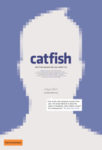 Last year, The Social Network was largely hailed as one of the most important films of our time, capturing the zeitgeist of a generation. While this proposition is questionable, Facebook founder Mark Zuckerberg was named Time Magazine Person of the Year shortly after the film’s release. With over 600 million users as at January 2011, it is undeniable that the social networking site has had an impact on the world. Yet the question remains as to what impact it has had, and what does social networking mean to an increasingly networked society? What does it mean to have a personal paparazzi for every embarrassing and private moment of your life? Where the dramatised The Social Network gave us the origin story of the world’s biggest public notice board, documentary Catfish reveals the darker consequences of the phenomenon.
Last year, The Social Network was largely hailed as one of the most important films of our time, capturing the zeitgeist of a generation. While this proposition is questionable, Facebook founder Mark Zuckerberg was named Time Magazine Person of the Year shortly after the film’s release. With over 600 million users as at January 2011, it is undeniable that the social networking site has had an impact on the world. Yet the question remains as to what impact it has had, and what does social networking mean to an increasingly networked society? What does it mean to have a personal paparazzi for every embarrassing and private moment of your life? Where the dramatised The Social Network gave us the origin story of the world’s biggest public notice board, documentary Catfish reveals the darker consequences of the phenomenon.
Anybody that has already seen Catfish, or has read virtually any material on the substantial hype surrounding the film, will know that it is virtually impossible to speak about the film without revealing some spoiler or inadvertent clue about the outcome of the film. Yet such is the nature of the fascinating tale behind Henry Joost and Ariel Schulman’s film that is would be criminal to reveal more than absolutely necessary, for it is a story that unfolds precisely as it is meant to. The pair begin to film a documentary around Ariel’s brother Nev, a 24-year-old New York photographer who begins an email and Facebook correspondence with Abby, an eight-year-old prodigy artist living in rural Michigan. Soon his social network expands to encompass Abby’s mother, Angela and Abby’s attractive older sister, Megan. As he becomes more involved, how much does Nev really know about this family?
On the surface, Catfish is actually a fairly terrible documentary. Poorly shot by initially uninteresting people, the editing makes dramatic leaps that defy any kind of logic and force viewers to begin to question the authenticity of the whole film. If the leads had not stumbled upon such a fascinating story at the heart of their exploration, it would have remained just that: a shockingly executed piece of self-indulgent meandering. However, there is an interesting story here, one that simultaneously challenges belief and is a completely natural byproduct of our time. The story than unfolds is so compelling that like Exit Through the Gift Shop before it, it doesn’t matter whether it is real or not: it is fascinating viewing.
The nature of Catfish, or at least the marketing surrounding Catfish, necessitates discussing the film in abstracts, for fear of revealing too much of the film’s secrets. When the truth finally does arrive in the film, we do not so much unravel it as we are dropped into it, as though ambushed by the filmmakers. Indeed, this is much the same approach that the incredibly amateur duo take with the subjects of their documentary as well, ambushing them with the truth rather than simply letting the events play out their course naturally. Without stating too much, Angela is one of the most fascinating subjects of any film in recent memory, yet the extent to which we truly get to know her, or are left with any sense of resolution, is endlessly debatable. Her husband, another deceptively simple presentation, will perhaps leave some of the deepest cuts.
There is a saying that goes around on the online social networks that “Facebook is where you lie to your friends; Twitter is where you’re honest to strangers”. Whether the audience is seen as a group of friends or strangers is a question that will resonate long after you leave the cinema, as we are let in on some incredibly intimate moments coupled with an oh-so-convenient series of events. Yet it is the level of intimacy that the film lets us in on that in many ways sells the rest of the coincidences, with a tale that is impossible to tear yourself away from. This reviewer was lucky enough to see Catfish accompanied by a live Q & A session with the filmmakers at the Cinema Nova in Melbourne, and the story is even more compelling in the retelling. Regardless of how much of the film one chooses to believe, the story touches on the broader implications of living in an age where average people’s entire personal lives are played out in a very public forum. That is a tale that is still being played out, and will require further rumination over the coming decades.
The Reel Bits: Real or fake? It doesn’t really matter, as the tale that unfolds is such an intriguing reminder of the dangers of living in the 21st century. Just remember that like Psycho and The Blair Witch Project before it, it is much more satisfying if you go in as cold as possible.
Catfish was released by Hopscotch in Australia on January 26, 2011.




